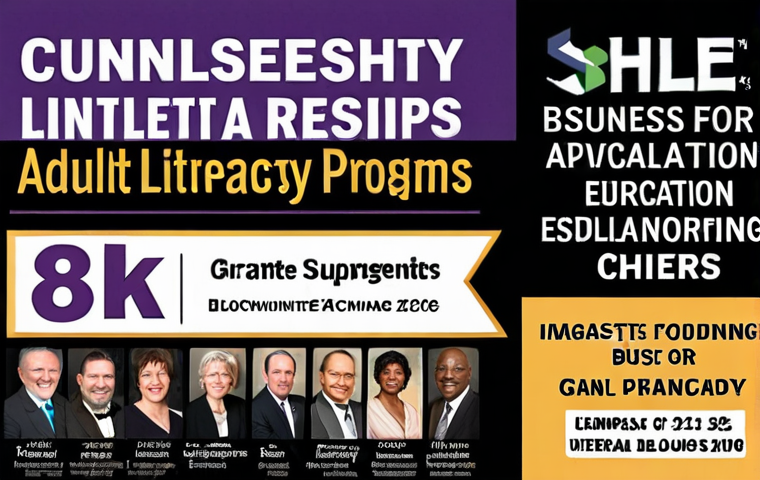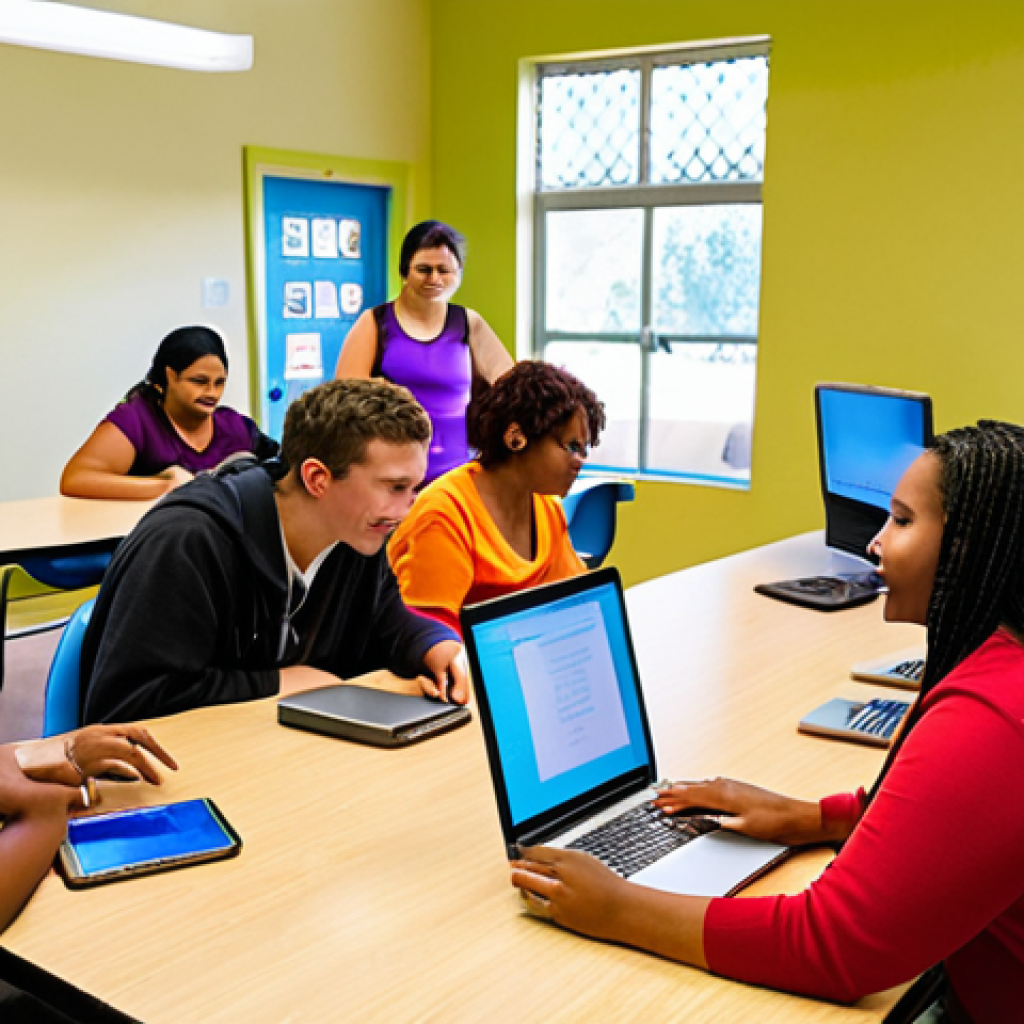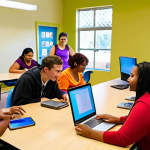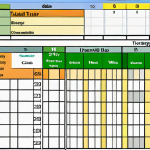Have you ever thought about the profound impact literacy can have on an individual’s life? It’s not just about reading words on a page; it’s about unlocking opportunities, empowering communities, and fostering personal growth.
From my own experience volunteering at a local community center, I’ve witnessed firsthand the transformative power of adult literacy programs and the dedication of literacy educators who work tirelessly to support adult learners.
The latest research suggests that personalized learning approaches, incorporating technology and addressing the specific needs of each learner, are key to maximizing success in adult literacy programs.
Also, there is a growing trend of integrating digital literacy skills alongside traditional reading and writing, preparing adults for the demands of the modern workforce and digital society.
Let’s delve deeper into the world of literacy educators and learning success in the article below.
Navigating the Landscape of Adult Literacy: Challenges and Opportunities

Understanding the Complex Needs of Adult Learners
Adult learners often come with a diverse range of backgrounds, experiences, and challenges. Many have faced interruptions in their education due to various factors such as financial constraints, family responsibilities, or previous negative experiences in school.
As a volunteer tutor, I encountered a single mother who dropped out of high school to support her family. Now, years later, she’s determined to earn her GED, but juggling work, childcare, and study time is a constant struggle.
Understanding and addressing these individual needs is crucial for creating effective literacy programs. Personalized support, flexible scheduling, and a welcoming learning environment can make a significant difference in their success.
Overcoming Systemic Barriers to Literacy Education
Systemic barriers, such as limited funding for adult education programs, a shortage of qualified instructors, and a lack of accessible learning resources, can significantly hinder adult literacy efforts.
In many communities, adult education centers are underfunded and understaffed, leading to long waiting lists and limited program offerings. I’ve seen firsthand how frustrating it can be for adults eager to improve their literacy skills but unable to access the resources they need.
Advocacy for increased funding, improved teacher training, and the development of high-quality, affordable learning materials are essential steps in overcoming these systemic barriers.
Leveraging Technology to Expand Access and Enhance Learning
Technology offers exciting opportunities to expand access to literacy education and enhance the learning experience for adult learners. Online learning platforms, educational apps, and digital literacy tools can provide flexible and engaging learning opportunities that fit into busy schedules.
I’ve noticed that many of my students are more comfortable using tablets or smartphones than traditional textbooks. Integrating technology into literacy programs can also help learners develop essential digital literacy skills, preparing them for the demands of the modern workforce.
However, it’s important to address the digital divide by providing access to technology and training for those who may lack the necessary skills or resources.
The Vital Role of Literacy Educators: Nurturing Growth and Confidence
Creating a Supportive and Inclusive Learning Environment
Literacy educators play a critical role in creating a supportive and inclusive learning environment where adult learners feel safe, respected, and empowered to take risks.
This involves building strong relationships with learners, understanding their individual goals and learning styles, and providing personalized feedback and encouragement.
I always make a point of celebrating small victories and acknowledging the progress my students make, no matter how incremental it may seem. Creating a positive and encouraging atmosphere can help build confidence and motivation, leading to greater success in literacy development.
Employing Effective Teaching Strategies Tailored to Adult Learners
Adult learners require teaching strategies that are tailored to their unique needs and experiences. Unlike children, adults bring a wealth of life experiences to the learning process.
Effective literacy educators leverage this knowledge by connecting learning to real-world contexts and providing opportunities for learners to apply their skills in practical situations.
Active learning strategies, such as group discussions, problem-solving activities, and hands-on projects, can also enhance engagement and retention. For example, I helped a group of students start a small business selling handmade crafts at the local farmers market.
This project not only improved their literacy skills but also helped them develop entrepreneurial skills and gain confidence in their abilities.
Providing Individualized Support and Encouragement
Many adult learners have experienced past failures or negative experiences in school, which can lead to feelings of self-doubt and anxiety. Literacy educators must provide individualized support and encouragement to help learners overcome these challenges and build confidence in their abilities.
This involves identifying learning gaps, providing targeted instruction, and celebrating successes, no matter how small. I often remind my students that learning is a journey, not a destination, and that setbacks are a normal part of the process.
Offering ongoing support and encouragement can help learners stay motivated and persevere through difficult times.
Unlocking Potential: Measuring and Celebrating Learning Success
Defining Success Beyond Traditional Metrics
Traditional metrics, such as standardized test scores, may not fully capture the diverse ways in which adult learners experience success. It’s important to define success more broadly, taking into account individual goals, personal growth, and increased self-confidence.
For some learners, success may mean earning a GED, while for others, it may mean being able to read to their children or fill out a job application. I’ve seen learners who initially struggled to read a simple sentence blossom into confident writers and effective communicators.
Celebrating these individual achievements can be incredibly motivating and rewarding.
Implementing Comprehensive Assessment Strategies
Comprehensive assessment strategies, including formative and summative assessments, can provide valuable insights into learner progress and inform instructional decisions.
Formative assessments, such as informal observations and classroom discussions, allow educators to monitor learner understanding and provide timely feedback.
Summative assessments, such as tests and projects, provide a more comprehensive measure of learning outcomes. By using a variety of assessment methods, educators can gain a holistic understanding of learner progress and tailor instruction to meet individual needs.
Recognizing and Celebrating Achievements
Recognizing and celebrating achievements, both big and small, is essential for fostering a positive learning environment and motivating adult learners.
This can involve acknowledging progress in class, providing certificates of completion, or hosting graduation ceremonies. I organized a small graduation ceremony for my students who earned their GEDs.
Seeing their proud faces as they received their diplomas was an incredibly moving experience. Celebrating these milestones reinforces the value of learning and encourages learners to continue pursuing their educational goals.
The Broader Impact: Literacy as a Catalyst for Community Development
Empowering Individuals and Families
Literacy has a profound impact on individuals and families, empowering them to improve their lives and create a better future. Adults with strong literacy skills are more likely to find employment, earn higher wages, and participate in civic life.
They are also better equipped to support their children’s education and health. I witnessed a family where the mother, after completing a literacy program, was able to help her children with their homework for the first time.
This not only improved her children’s academic performance but also strengthened the bond between mother and child.
Strengthening Communities and Economies
Literacy is a cornerstone of strong communities and thriving economies. Communities with high literacy rates tend to have lower rates of poverty, crime, and unemployment.
A literate workforce is also essential for attracting businesses and fostering economic growth. Investing in adult literacy programs is an investment in the future of our communities.
Supporting local literacy initiatives, volunteering as a tutor, and advocating for increased funding for adult education are all ways to contribute to building stronger, more prosperous communities.
Promoting Social Justice and Equity
Literacy is a fundamental human right, and ensuring equitable access to literacy education is essential for promoting social justice. Literacy disparities often reflect broader inequalities in society, such as poverty, discrimination, and lack of access to resources.
By addressing these systemic barriers and providing targeted support to marginalized communities, we can create a more just and equitable society for all.
I believe that literacy is a powerful tool for empowerment and social change. By working together to promote literacy, we can create a world where everyone has the opportunity to reach their full potential.
Harnessing Resources: Connecting Learners with Support Systems
Navigating the Landscape of Adult Education Programs
Adult education programs come in various forms, each catering to different needs and learning preferences. Community colleges often offer GED preparation courses and basic skills training, while local libraries may host literacy workshops and tutoring sessions.
Non-profit organizations also play a crucial role, providing specialized programs for specific populations, such as immigrants or individuals with learning disabilities.
Helping learners navigate this landscape and find the program that best suits their goals and circumstances is vital. During my time volunteering, I found that many adults were overwhelmed by the sheer number of options available.
Providing clear, concise information and guidance can make a significant difference.
Leveraging Community Resources and Partnerships
Collaboration between literacy programs and community organizations can create a comprehensive support system for adult learners. Partnering with local businesses, healthcare providers, and social service agencies can provide learners with access to resources they might not otherwise have.
For example, a literacy program could partner with a local hospital to offer health literacy workshops or with a community center to provide childcare services.
By working together, we can create a network of support that addresses the holistic needs of adult learners and helps them achieve their goals.
Building a Sustainable Support Network
Building a sustainable support network for adult learners requires ongoing commitment and collaboration from various stakeholders. This includes providing financial support for literacy programs, recruiting and training volunteer tutors, and advocating for policies that promote adult education.
It also involves creating a culture of literacy within communities, where learning is valued and celebrated. I firmly believe that literacy is a shared responsibility, and that everyone has a role to play in creating a more literate society.
Adapting to Change: Embracing Innovation in Literacy Education
Integrating Digital Literacy Skills
In today’s digital age, digital literacy skills are essential for success in both personal and professional life. Literacy programs must integrate digital literacy training to equip learners with the skills they need to navigate the digital world, access information, and communicate effectively online.
This includes teaching learners how to use computers, access the internet, evaluate online sources, and protect themselves from online threats. During my work with adult learners, I have seen how empowering it can be for them to learn how to use email, social media, and online banking.
These skills not only improve their quality of life but also open up new opportunities for employment and civic engagement.
Exploring Innovative Teaching Methodologies
Traditional teaching methods may not always be effective for adult learners, who often have diverse learning styles and preferences. Exploring innovative teaching methodologies, such as project-based learning, gamification, and personalized learning, can enhance engagement and improve learning outcomes.
Project-based learning allows learners to apply their skills in real-world contexts, while gamification uses game-like elements to make learning more fun and engaging.
Personalized learning tailors instruction to meet the individual needs of each learner. I experimented with different teaching methods, and I’ve found that a blended approach that combines traditional instruction with innovative techniques often yields the best results.
Embracing Lifelong Learning
Literacy is not a one-time achievement but rather a lifelong journey. Encouraging adult learners to embrace lifelong learning can help them continue to grow and develop their skills throughout their lives.
This involves promoting a love of reading, providing access to lifelong learning opportunities, and fostering a growth mindset. I encourage my students to set new learning goals for themselves, even after they have achieved their initial objectives.
By embracing lifelong learning, they can stay current with new developments in their fields, adapt to changing circumstances, and continue to enrich their lives.
Empowering Voices: Fostering Self-Expression and Advocacy
Encouraging Creative Writing and Storytelling
Literacy is not just about reading and writing; it’s also about self-expression and creativity. Encouraging adult learners to engage in creative writing and storytelling can help them develop their voices, express their thoughts and feelings, and connect with others.
This can involve writing poetry, short stories, or personal essays. I organized a writing workshop where my students shared their personal stories with each other.
It was amazing to see how much confidence they gained and how much they connected with one another through their writing.
Developing Critical Thinking and Media Literacy Skills
In today’s information-saturated world, critical thinking and media literacy skills are essential for navigating the complex landscape of news, information, and propaganda.
Literacy programs must equip learners with the skills they need to evaluate sources, identify bias, and make informed decisions. This includes teaching learners how to distinguish between facts and opinions, recognize logical fallacies, and analyze media messages.
I found that many of my students were initially unaware of the importance of media literacy. By teaching them how to critically evaluate information, I empowered them to become more informed and engaged citizens.
Promoting Advocacy and Civic Engagement
Literacy can be a powerful tool for advocacy and civic engagement. By developing strong literacy skills, adult learners can become more active and informed participants in their communities.
This can involve voting, volunteering, advocating for policies that support their interests, and running for office. I encouraged my students to become involved in local community organizations and to use their voices to make a difference.
By promoting advocacy and civic engagement, we can empower adult learners to create positive change in their communities and beyond.
| Area | Challenges | Opportunities | Strategies |
|---|---|---|---|
| Access | Limited resources, geographic barriers, lack of awareness | Online learning, mobile technology, community partnerships | Expand online programs, offer flexible schedules, promote awareness |
| Funding | Inadequate government support, limited private investment | Fundraising campaigns, grant applications, corporate sponsorships | Advocate for increased funding, diversify funding sources, build relationships |
| Instruction | Lack of qualified instructors, outdated teaching methods | Professional development, innovative pedagogies, personalized learning | Invest in teacher training, implement new strategies, tailor instruction |
| Technology | Digital divide, lack of access to devices and internet | Affordable technology, public access points, digital literacy training | Provide devices and internet access, offer digital literacy courses |
| Support | Limited support services, lack of community involvement | Community partnerships, volunteer tutors, mentoring programs | Build support networks, recruit volunteers, establish mentoring programs |
Navigating the complexities of adult literacy is a challenge that demands our unwavering attention and collective effort. As we’ve explored, the journey is fraught with obstacles, but brimming with opportunities to empower individuals, strengthen communities, and promote social equity.
Let’s continue to champion this cause, fostering a world where literacy unlocks the full potential of every human being.
Wrapping Up
As we conclude, remember that fostering adult literacy isn’t just about teaching reading and writing—it’s about empowering individuals to lead fuller, more meaningful lives. Let’s continue to champion this cause, one story, one lesson, one success at a time. Thank you for joining this journey!
Useful Information
1. Local Libraries: Most libraries offer free literacy programs and resources, including tutoring, workshops, and access to computers and the internet. Check your local library’s website or visit in person to learn about their offerings.
2. Community Colleges: Community colleges often provide affordable adult education courses, including GED preparation, English as a Second Language (ESL), and basic skills training. Explore the options available at your nearest community college.
3. Non-profit Organizations: Many non-profit organizations specialize in adult literacy services, often tailoring programs to specific populations, such as immigrants, refugees, or individuals with learning disabilities. Search online for literacy non-profits in your area.
4. Online Learning Platforms: Platforms like Coursera, Khan Academy, and edX offer a wide range of free or low-cost courses that can help adult learners improve their literacy skills. Take advantage of these accessible resources.
5. Volunteer Opportunities: Consider volunteering as a literacy tutor to make a direct impact on the lives of adult learners in your community. Contact local literacy organizations to inquire about volunteer opportunities.
Key Takeaways
Adult literacy is a multifaceted issue that requires a holistic approach. Access to resources, personalized support, and innovative teaching methods are crucial for success. By fostering a supportive and inclusive learning environment, we can empower adult learners to achieve their goals and transform their lives.
Frequently Asked Questions (FAQ) 📖
Q: What are some specific challenges adult learners face when trying to improve their literacy skills?
A: From what I’ve seen at the community center, life gets in the way! Adults often juggle work, family, and other commitments, leaving little time or energy for learning.
Also, many feel embarrassed about their reading level, which can make it tough to ask for help. It’s like they’re carrying around this invisible weight of past failures, making it harder to try again.
Financial constraints can also be a major hurdle; paying for classes or even transportation can be a real stretch.
Q: How can technology be effectively incorporated into adult literacy programs?
A: I’ve noticed that using tablets with interactive reading apps gets people hooked! It’s less intimidating than sitting in a classroom with a textbook. But it’s not just about handing out devices; it’s about tailoring the content to their interests.
If someone’s passionate about cars, find reading materials about car repair or racing. Plus, using online platforms for communication and feedback makes learning more accessible and personalized, almost like having a tutor in your pocket.
It’s definitely not a one-size-fits-all situation, so the tech needs to be integrated thoughtfully, alongside human support and encouragement.
Q: Besides improved reading and writing, what other benefits do adult literacy programs offer?
A: Oh man, the ripple effect is huge! Confidence skyrockets. I’ve seen people go from being super shy and hesitant to volunteering to read aloud in group settings.
That boosted self-esteem spills over into other areas of their lives – they’re more likely to pursue better jobs, engage in their communities, and even help their own kids with homework.
It’s not just about letters and words; it’s about empowering people to take control of their lives and build a brighter future for themselves and their families.
It is truly inspiring.
📚 References
Wikipedia Encyclopedia
구글 검색 결과
구글 검색 결과
구글 검색 결과
구글 검색 결과
구글 검색 결과





